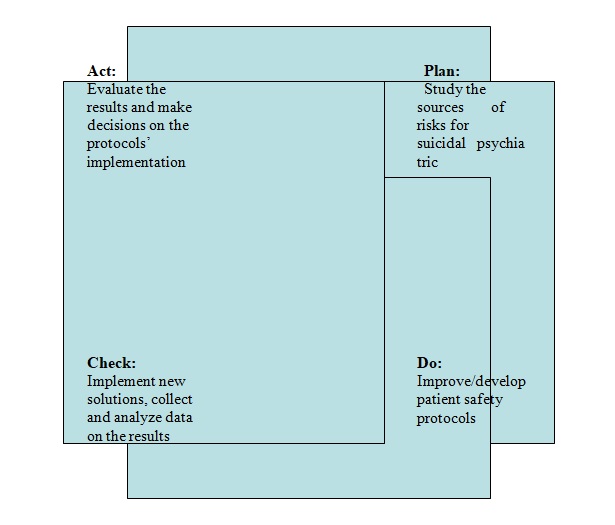The provision of mental health services is aimed at increasing people’s chances to recover and return to work and social life. According to interviews with mental health nurses, patients with suicidal ideations manage to take their lives despite professionals’ compliance with job instructions (Türkleş, Yılmaz, & Soylu, 2018). Thus, risks related to the management of suicidal patients in mental health departments present an important quality improvement topic to be addressed.
To develop and implement the quality improvement project, it is of great importance to analyze the potential sources of health risks for suicidal psychiatric patients. Thus, the particular method that can be used to approach the identified problem is Plan-Do-Check-Act also known as PDCA. It involves four interdependent steps, and for the first step to be implemented, objectives related to the problem should be selected (Holly, 2014). In the context of risks existing for suicidal patients, the objectives may include decreased patient suicide rates and reductions in patients’ access to the potential means of suicide (Bhatt et al., 2018; Holly, 2014). Within the frame of the next phase, safety protocols have to be developed from scratch or improved, including plans for training interventions targeted at the hospital staff (Holly, 2014). This phase typically requires a lot of time, and gaps in the currently used patient safety protocols have to be studied.
The “check” phase involves data collection and the analysis of preliminary results. During this step, the effectiveness of new or improved hospital safety protocols should be assessed, with the information presented using various visualization tools (Holly, 2014). To measure progress related to the risks of suicide, Pareto charts can be helpful. Finally, as is shown in Figure 1, the evaluation of the results helps to identify improvement areas in new safety protocols for suicide prevention and act based on this information (Holly, 2014). Concerning the reasons to use the PDCA method, its simplicity aligns with the chosen objectives and this approach allows for gap analysis, which is critical to success.

References
Bhatt, M., Perera, S., Zielinski, L., Eisen, R. B., Yeung, S., El-Sheikh, W.,… Mackie, P. (2018). Profile of suicide attempts and risk factors among psychiatric patients: A case-control study. PloS One, 13(2), e0192998.
Holly, C. (2014). Scholarly inquiry and the DNP capstone. New York, NY: Springer Publishing Company.
Türkleş, S., Yılmaz, M., & Soylu, P. (2018). Feelings, thoughts and experiences of nurses working in a mental health clinic about individuals with suicidal behaviors and suicide attempts. Collegian, 25(4), 441-446. Web.

